August 17, 2020

 Whitney Griffin, appointee to the Michigan Coronavirus Task Force on Racial Disparities, reflects on her experiences investing in statewide advisory roles.
Whitney Griffin, appointee to the Michigan Coronavirus Task Force on Racial Disparities, reflects on her experiences investing in statewide advisory roles.Millennials are key to influencing societal change and now, more than ever, we should be advocating for our communities and causes that we are passionate about. As a concerned citizen, my voice matters — and so does yours! Whether you’re an emerging or established leader, you have the right to advocate for the advancement of a fair and equitable community. It can be daunting to challenge a dynamic force that is already moving against you and the community you serve, which is why collaboration and organization is key.
I volunteer my time and resources to support a variety of causes and organizations in Metro Detroit, including advocating for underserved communities. When the COVID-19 pandemic struck, my timeline was inundated with headlines about the deaths of local leaders and the pandemic’s effects on my community. I knew that there were gross disparities for Blacks related to COVID-19, especially with regard to implicit biases and access to testing, and with so much work to be done, I wasn’t sure how to even begin chipping away at the larger issues to affect substantive change. I saw some of our best and brightest community leaders succumb to this awful, non-discriminatory disease. I also lost my aunt, who contracted the virus while living as a nursing home resident in the state’s hardest-hit zip code during the earlier height of the pandemic.
Fast forward to April, Governor Gretchen Whitmer and Lt. Governor Garlin Gilchrist appointed me to serve on the Michigan Coronavirus Task Force on Racial Disparities (Task Force) to advise on a statewide action response plan that would establish more equitable pathways to better health outcomes for Black residents across Michigan. The Task Force includes leadership across multiple sectors and demographics that consult and advise on viable solutions to mitigate these reported disparities. I have not been shy about addressing some of these issues with a millennial perspective, including support for digital campaigns for broader awareness and innovative ideas for mobile and at-home testing.
In just 4 months of Task Force service, we have achieved measurable results: racism is now declared a public health crisis in Michigan, all Michigan healthcare employees must complete implicit bias training, and we have increased access to testing in more community neighborhoods. And more work is actively being done. I couldn’t be more proud of the progress that we have collectively made in mitigating these health disparities by developing more equitable pathways to better health outcomes and I look forward to continuing this important work.
My service on the Task Force has been an illuminating experience. I encourage more young professionals and entrepreneurs to leverage their voices and platforms to serve their communities. As millennials and Gen-Xers, we have a library of resources to amplify our voices and make our voices heard. Detroit has several organizations that are amazing conduits for professional development and community service programming. If you’re interested in finding more ways to grow your platform and establishing a pipeline for advocacy opportunities, please check out Detroit Young Professionals, New Leaders Council, Young Nonprofit Professionals Network, Challenge Detroit, and more on www.letsdetroitdev.wpengine.com.
To learn more about Whitney’s experience serving on the Michigan Coronavirus Taskforce on Racial Disparities, join the conversation on Tuesday, August 18th at 6pm. Register on Eventbrite.
Whitney Griffin is the Director of Marketing and Communications at the Downtown Detroit Partnership. Griffin is a devoted community servant and lends her marketing, communications, advocacy, and organizing expertise to a variety of community causes to uplift Detroit. She currently serves on the board of the Detroit Institute of Arts’ Founders Junior Council, First Independence Bank’s Millennial Advisory Board, and the National Black MBA Association’s Detroit Chapter, and was the President of Detroit Young Professionals from 2016-2019.
Written By Let’s Detroit Ambassador Whitney Griffin